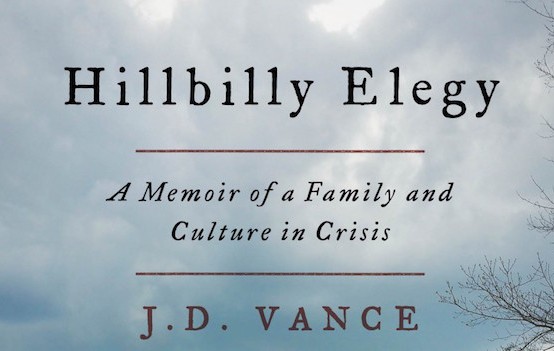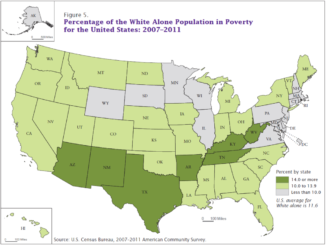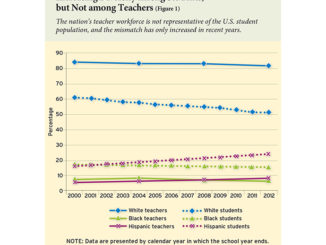
by Peter Beinart
The Republican Party long insisted that the troubles of the inner city were cultural—but rather than apply the same logic to struggling blue-collar communities, Trump blamed their problems on external forces.
Last week, Donald Trump advisor Stephen Moore, who has built his career advocating tax cuts for the rich and the privatization of America’s welfare state, said something startling to congressional Republicans. He said Republicans are no longer the party of Ronald Reagan. “Just as Reagan converted the GOP into a conservative party,” Moore reportedly declared, “Trump has converted the GOP into a populist working-class party.”
What does that mean? On its face, it seems fairly clear. Trump says he opposes NAFTA and the Trans-Pacific Partnership and will prevent companies from leaving the US. During the campaign, he came out against overhauling Medicare and Social Security. He’s called for new spending on infrastructure. In each case, he ostensibly supports government intervention in the economy, which runs counter to the gospel of Reagan.
But when you dig further, the policy shift looks less dramatic. It’s extremely unlikely Trump will prove able to renegotiate NAFTA. His infrastructure proposal consists not of government spending but of tax credits to investors. Georgia Congressman Tom Price, who Trump is reportedly considering for Secretary of Health and Human Services, supports turning Medicare into a voucher program. Trump is also reportedly planning income and business tax cuts that would overwhelmingly benefit the rich. In other words, Trump’s plan looks a lot like the old Republican Party’s plan: Shrink government programs and let the rich pocket the difference.
Moreover, personnel, as the cliché goes, is policy. If Trump really wanted to break from Reaganite economics, why did he choose Mike Pence, an orthodox economic conservative, as his running mate and head of his transition team? Why is he taking advice from Stephen Moore?
There’s a different way of understanding the transformation that Moore describes. It’s less about policy than rhetoric. It struck me as I was reading J.D. Vance’s beautiful memoir about his Appalachian upbringing, Hillbilly Elegy. What makes Vance’s book so striking is not the problems he describes: deindustrialization, drug addiction, single motherhood, a definition of masculinity that inhibits academic achievement. William Julius Wilson and Charles Murray made their reputations dissecting these ills 30 years ago. What makes Vance’s book so arresting is that the people he’s describing are white.
It’s not that working class whites didn’t suffer from these maladies in the 1980s. They clearly did, though perhaps not as starkly as they do now. But in the public discourse of the Reagan era, such problems were generally attributed to African Americans. They were attributed, in other words, to a population that did not vote for Republicans, and whom Republicans often slandered in their search for white votes. When Reagan denounced “welfare queens” and the “strapping young buck” who used food stamps to buy steak, everyone assumed he was talking about blacks.
Reagan era conservatives made two arguments about the pathologies of the inner city. First, that they were the result of culture, not economics. The root problem was family breakdown. Second, that because the problem was cultural, government programs aimed at helping the underclass would either prove ineffective, or downright counterproductive. The best thing the government could do was to exhort poor African Americans to get and stay married, and to abolish programs like Aid to Families with Dependent Children that made it easier for them to avoid doing so.
In this sense, Vance is something of a Reaganite. He describes his Appalachian friends and neighbors with deep affection. And he suggests that, at the margins, smart public policy might improve their lot. But he defines their problems as more cultural than economic. In the book’s introduction, Vance describes a young man and his pregnant girlfriend who hold decent jobs at a local tile factory. Their atrocious work ethic gets them both fired. Vance describes food stamp fraud, white “welfare queens” and liberal state legislators whose efforts to eliminate predatory lending would actually harm the poor people they’re designed to help. He acknowledges the decline of manufacturing jobs. But to hear him tell it, the biggest problem facing the white working class is “the feeling that our choices don’t matter.”
Trump never speaks this way. In fact, he speaks less about personal responsibility than any Republican presidential nominee since Reagan. He’s the anti-J.D. Vance. Vance wants blue-collar whites to blame multinational corporations less for their woes. Trump blames them more than any Republican nominee ever has. Vance cautions that government can’t save Appalachia. Trump, by promising a crackdown on immigrants and outsourcing, vows that it will.
This is the real shift Trump is bringing to the GOP. Under Reagan, Republicans demanded personal responsibility from African Americans and ignored the same cultural problems when displayed by whites. Under Trump, Republicans acknowledge that whites exhibit those same pathologies. Trump, for instance, spoke frequently during the campaign about drug addiction in white, rural states like New Hampshire. But instead of demanding personal responsibility, Trump’s GOP promises state protection. Unlike Vance, who speaks about his poor white neighbors in the way Reagan-era conservatives spoke about poor blacks, Trump-era conservatives describe the white working class as the victims of political and economic forces beyond their control. Sounding a bit like Jesse Jackson defending the black underclass in the 1980s, Trump Republicans say that what the white underclass needs today is not moralistic sermonizing but government assistance and cultural respect.
In recent months, many readers have turned to Hillbilly Elegy in hopes of understanding why white working class voters flocked to Trump. Implicitly, Vance offers an explanation. But his explanation is disturbing. His Appalachian and rust belt neighbors, Vance suggests, want easy answers. They want someone else to blame. By ditching the language of personal responsibility, Trump has created a Republican Party able to tell them what they want to hear. He has done so even as his administration begins implementing a policy agenda that redistributes wealth upwards. This the new GOP populism that Moore describes. God help us when J.D. Vance’s neighbors realize it’s a scam.



